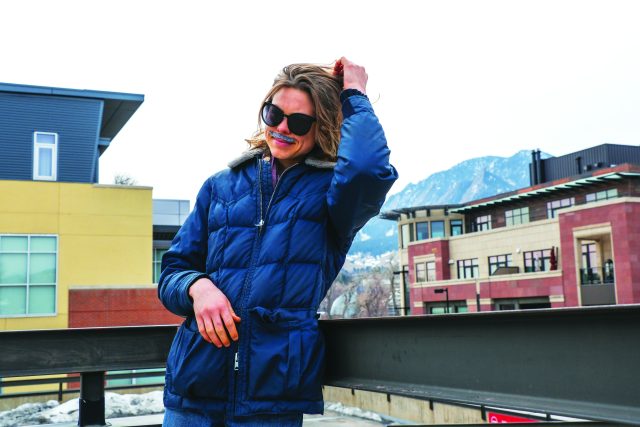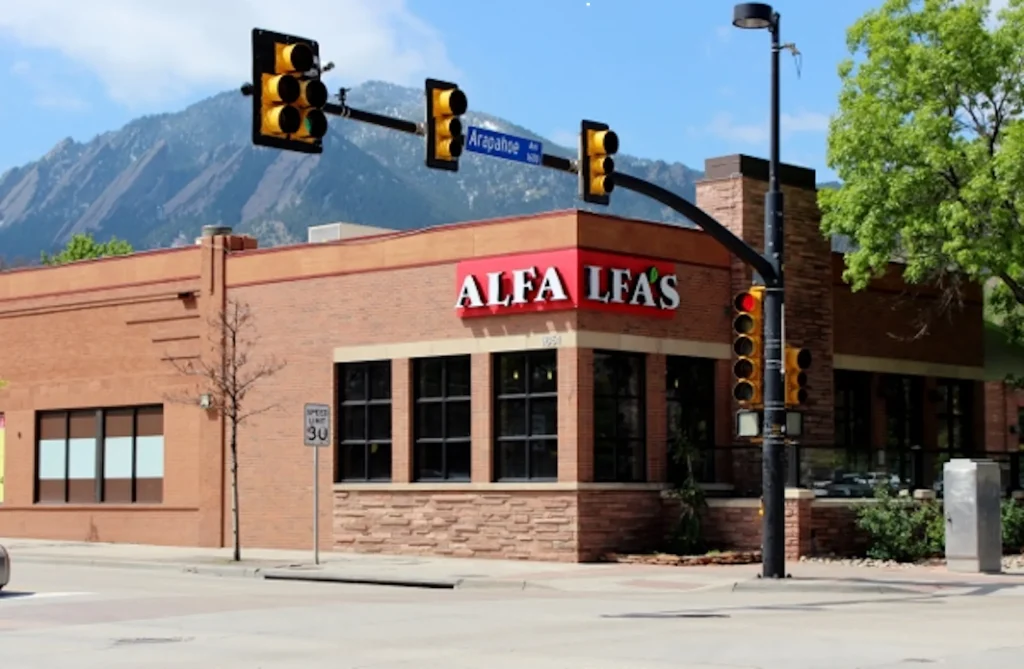
Gabby Vermeire still remembers the first meme she posted in 2019. The template: an anime illustration of a bespectacled man gesturing fondly towards a butterfly with three captions splashed across the frame. On the man, “midwesterners,” on the butterfly, “Pasta Jay’s” — and beneath both, “Is this literally the best place in Boulder?”
The image macro was a big hit among Vermeire’s friends in their group chat. Then it made its way to the city’s dedicated subreddit, r/Boulder, where strangers upvoted the post 250 times. But Instagram is where Vermeire’s oddball local memes found a real audience, one that’s inched within 10,000 followers and garnished the tall, bookish paralegal with an air of micro-celebrity, at least online, and a cult status among CU students and local 20-somethings.
As it turned out, there was a vacuum for memes that put Boulder’s ineffable weirdness into context, and Vermeire was happy to fill it. She had a lifetime of training after all; having grown up on The Hill, the city’s contradictions and archetypes — bohemian millionaires, alt-medicine moms, Google tech bros, and of course, the many shades of CU student life — were as familiar as the local fauna. Her research pedigree includes an undergraduate degree in political science and biology from CU Boulder. This is Whole Foods Daddy’s natural habitat.
“I grew up in fear of CU students, which is a very natural, normal and healthy thing. Then I became a CU student. Now I’m older than them and still maintain a healthy fear,” Vermeire, 27, says with a laugh between sips of West End Tavern’s house malbec.
An affinity for wine is one aspect of her online persona inspired by reality. The ritual lubricates Vermeire’s creative process and helps her unwind after grueling shifts in family court.
But when it comes to her identity, a certain degree of ambiguity has provided Vermeire freedom to experiment with characters. One is the wise “Chrone,” sometimes depicted as a babushka chastising sorority girls for sporting club wear during lethal cold snaps. Others gleefully indulge various levels of thirst for species of men only found in Boulder, from “fit wook Dads going commando under their harem pants,” to recumbent cyclists with the “legs of Zeus.” These clues combined to suggest an important facet of Vermeire’s identity that her early content didn’t: that the account is run by a woman.
“I’ve started to become more transparent about this coming from the perspective of a woman because people kept assuming I was a dude, likely because people think boys are funnier than girls,” Vermeire says.
But the “manic-pixie-granola-girl desperate for guys” presented by Whole Foods Daddy is inflated for comic effect. The real Vermiere is less sure-footed, and more ready to laugh at her own expense.
“I constantly identify as an uncool person. That’s a big part of my actual personality,” Vermeire says. Many of her posts are marinated in that same self-deprecating charm, a key ingredient for relatability.

‘A total contradiction’
The memes would ring hollow if they didn’t faithfully capture Boulder, both its sparkle and blemishes. On that front, Vermeire has developed a working theory of her subjects.
“Boulderites love to work out and are really hot, for the most part. Those two things are probably related,” she says. If there is a thread connecting the city’s denizens, Vermeire posits, it’s an enduring drive “to become aspirational versions of themselves,” which introduces a problem. “If you’re only built on self-actualizing, what’s real anymore?”
Her answer: the surrounding natural wonder. “The mountains and beauty are the bedrock,” Vermeire says. “It’s the thing that’s real and enduring about this place.”
Less savory but no less real are the college town’s manifold inequalities. It was at Alfalfa’s, the now-defunct natural grocer on Broadway, where Vermeire sharpened her political consciousness working a service position after college. The store, for her, was Boulder in miniature.
“It’s where a huge amount of inspiration for the page came from,” she says. “You’d sort of see what the power dynamics in the city are.”
There was plenty of comic material at Alfalfa’s, too. But these lighter elements were “juxtaposed with homeless people shooting up in the back room and creepy advances from older, wealthy men who were prominent in the community, who can literally get away with anything because they own the world.”
Beyond running gags on Boulder stereotypes, Whole Foods Daddy performs a subtle civic function: illuminating the gap between the city’s polished, affluent presentation and those struggling on its margins. Boulder’s Gross Metro Product, the combined value of goods and services produced within its boundaries, is larger than the GDP of over half the countries in Africa. Nevertheless, solutions for housing its homeless or working-class residents continue to elude the city government.
“That’s what’s so complicated about Boulder,” Vermeire says. “That’s why you can’t describe it any other way than a total contradiction.”
Not that Vermeire sees her Instagram account as a treatise on the city’s social ills. “I come from the perspective of trying to be funny, first and foremost. And I think that’s the main purpose of the page. I want people to laugh over something we all have in common,” Vermeire says, tipping back her wine glass.














